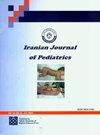Jujube Versus Polyethylene Glycol for Maintenance Treatment of Pediatric Functional Constipation: A Randomized Clinical Trial
IF 0.4
4区 医学
Q4 PEDIATRICS
引用次数: 0
Abstract
Background: Functional constipation (FC) is a common major problem in children. This study compared Jujube paste and polyethylene glycol (PEG) as laxative drugs in children with FC. Ziziphus Jujuba Mill (Jujube) was selected according to traditional Iranian medicine because it is native to Iran and a large extent of Asia, is safe and easy to access, with acceptable taste to children. Methods: This randomized controlled clinical trial was performed on 128 children aged 2 to 12 with FC according to Rome IV criteria. Patients were randomly divided into two groups of Jujube paste and PEG and underwent four weeks of treatment. The efficacy, safety, and tolerability of the Jujube oral product were compared with PEG. Results: Following four weeks of therapy, all clinical symptoms of constipation according to Rome IV criteria were improved significantly in both groups (P < 0.05). In all the seven criteria of Rome IV, Jujube paste was as effective as PEG and even stronger in reducing stool stiffness (P < 0.0001). No hazardous side effect was reported in the two groups. Moreover, the medication acceptance rate was higher in the group receiving Jujube paste than in the group receiving PEG. Conclusions: Jujube paste is as effective as PEG in pediatric FC. This product has high nutritional value and antioxidant properties, so it can be a safe substitute for PEG in pediatric FC.红枣与聚乙二醇维持治疗儿童功能性便秘:一项随机临床试验
背景:功能性便秘(FC)是儿童常见的主要问题。本研究比较了红枣膏和聚乙二醇(PEG)作为FC患儿的泻药。Ziziphus Jujuba Mill(枣)是根据伊朗传统医学选择的,因为它原产于伊朗和亚洲的大部分地区,安全,易于获取,儿童可接受的味道。方法:本随机对照临床试验对128名2 ~ 12岁FC患儿进行临床试验,符合Rome IV标准。将患者随机分为红枣膏和聚乙二醇两组,进行为期四周的治疗。比较了红枣口服制品与聚乙二醇的疗效、安全性和耐受性。结果:治疗4周后,两组按Rome IV标准便秘临床症状均明显改善(P < 0.05)。在Rome IV的所有7个标准中,枣膏在降低大便僵硬方面与PEG一样有效,甚至更强(P < 0.0001)。两组均无危险副作用的报道。同时,红枣膏组的用药接受率高于PEG组。结论:红枣膏治疗小儿FC的疗效与PEG相当。本品具有较高的营养价值和抗氧化性能,可作为小儿FC中PEG的安全替代品。
本文章由计算机程序翻译,如有差异,请以英文原文为准。
求助全文
约1分钟内获得全文
求助全文
来源期刊
CiteScore
0.90
自引率
20.00%
发文量
75
审稿时长
6-12 weeks
期刊介绍:
Iranian Journal of Pediatrics (Iran J Pediatr) is a peer-reviewed medical publication. The purpose of Iran J Pediatr is to increase knowledge, stimulate research in all fields of Pediatrics, and promote better management of pediatric patients. To achieve the goals, the journal publishes basic, biomedical, and clinical investigations on prevalent diseases relevant to pediatrics. The acceptance criteria for all papers are the quality and originality of the research and their significance to our readership. Except where otherwise stated, manuscripts are peer-reviewed by minimum three anonymous reviewers. The Editorial Board reserves the right to refuse any material for publication and advises that authors should retain copies of submitted manuscripts and correspondence as the material cannot be returned. Final acceptance or rejection rests with the Editors.

 求助内容:
求助内容: 应助结果提醒方式:
应助结果提醒方式:


